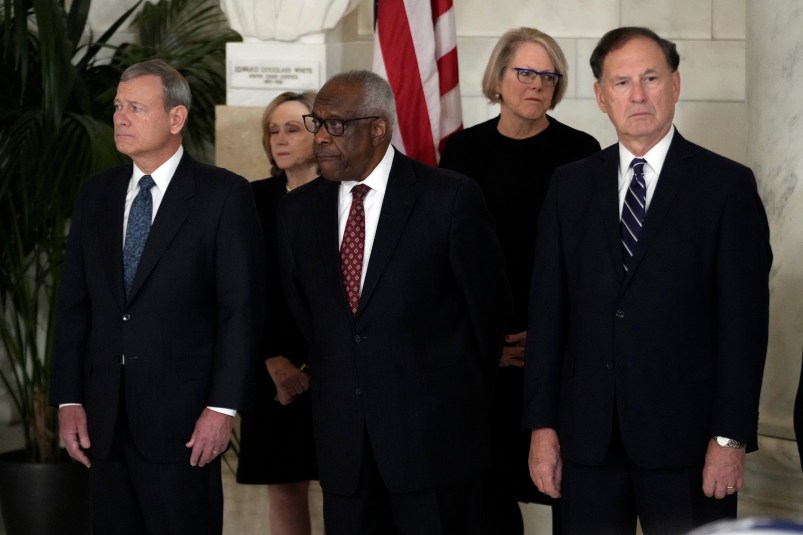President Obama’s most recent attempt to cut a big budget deal with John Boehner ended with a conciliatory Obama agreeing to cut Social Security benefits and a hapless Boehner launching his disastrous Plan B debacle. Liberals were angry at Obama for conceding too much; conservatives were angry at Boehner for — well, for a variety of things, but mainly they were upset that their backs were up against a wall and they had no way to prevent taxes from going up.
It was a mess. But there was a certain logic to it.
Those early negotiations were premised on the notion that Obama was going to get about $800 billion in new revenue no matter what. He reportedly even told Boehner “I get that for free.” Obama provided Boehner the option of making the bargain “grand” (that’s Washington for “a lot of cuts to social programs”), if he was willing to deal above and beyond that $800 billion.
Deficit reduction is a bad idea in a still-weak economy. But if the goal is deficit reduction this exercise in horse-trading made sense. You can quibble with the details, but basically Obama bracketed his $800 billion then told Boehner, “if you give me $400 billion in bonus revenue, an extension of emergency unemployment benefits, a few other goodies, I’ll give you several hundred billion dollars in promised cuts to Medicare and Social Security, including a down payment of chained CPI.”
If Boehner had said yes, deficits in the coming years would be lower than they are now, and both parties would have substantive achievements to boast about to their bases. Mission accomplished.
Instead Boehner said no, and the talks got kicked downstairs to the Senate where Harry Reid and Mitch McConnell were tasked with cutting a smaller deal.
The smaller deal taking shape lacks any such logic.
It, too, presumes Democrats can get $800 billion for free. But from there Democrats are offering to chip away at the revenue haul in exchange for bonus spending provisions. Arithmetically, this is an approach you might take if your goal was spending down a surplus, or implementing a stimulus. That’s why, as of last night, the parties were hovering in the vicinity of a deal that would be deficit neutral relative to current policy. This has nothing to do with deficit reduction. And though, per above, that’s a fine outcome in a weak economy, it raises the cock-eyed question of what the hell Congress has been arguing about for the last two years.
Then substantively, the details such as we know them are mostly downside for Dems.
Dems really want to extend those unemployment benefits, so a minor revenue concession to Republicans seems like an appropriate trade. But Dems are also conceding on issues like the Medicare “doc fix,” which has always had bipartisan support, and on delaying the sequester, which neither party wants to see implemented anyhow.
Moreover, all those spending concessions are temporary. Emergency unemployment benefits will eventually expire for good. The doc fix will lapse again. Delaying (or eliminating) the sequester is a one-off spending increase relative to current law. But the tax concessions Democrats make will not expire. And Dems will have forfeited the only leverage on the horizon — the expiration of the Bush tax cuts — which guarantees them higher revenues over GOP objections.
A deal like this re-enforces the GOP’s skewed approach to budgeting, which basically ignores the impact tax cuts or increases have on the deficit. It indulges their desire to reduce budget negotiations back down to what and how much to cut — to the status quo ante that new spending can’t be paid for with higher taxes.
And it calls into question Obama’s insistence that he’ll refuse to negotiate a debt limit increase early next year. Under the GOP’s most recent offer, the sequester will still be largely intact. And having agreed to compromise on the one thing he was supposed to get for free, Obama will be left to choose between two basically identical, but losing propositions: cut a skewed deal with Republicans to raise the debt limit; or “refuse” to negotiate over the debt limit, but reach the same endpoint in order to defuse the sequester.
Here’s another way to look at it: Relative to current policy, tax revenues will increase by about $5 trillion over 10 years automatically if Congress does nothing. Likewise, if Congress does nothing, spending will fall about $1.2 trillion over the same timeframe. Obama’s willing to give away $4.2 trillion in revenue from the get go, and then, apparently, negotiate down further from there. Republicans don’t want to yield on any of those spending cuts, and don’t think they have to. This is why Obama’s supporters are so distraught about the latest news reports.







